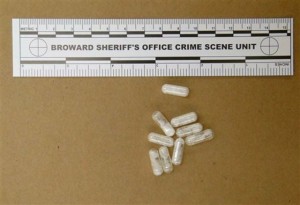
This Feb. 12, 2015 photo made available by the Broward Sheriff’s Office, Fla., shows confiscated vials of flakka. This emerging drug can alter brain chemistry in such a way that users can’t control their thoughts and it can increase adrenalin. (AP Photo/Broward Sheriff’s Office via AP)
One man ran naked through a Florida neighborhood, tried to have sex with a tree and told police he was the mythical god Thor. Another ran nude down a busy city street in broad daylight, convinced a pack of German shepherds was pursuing him.
Two others tried separately to break into the Fort Lauderdale Police Department. They said they thought people were chasing them; one wound up impaled on a fence.
The common element to these and other bizarre incidents in Florida in the last few months is flakka, an increasingly popular synthetic designer drug. Also known as gravel and readily available for $5 or less a vial, it’s a growing problem for police after bursting on the scene in 2013.
It is the latest in a series of synthetic drugs that include Ecstasy and bath salts, but officials say flakka is even easier to obtain in small quantities through the mail. Flakka’s active ingredient is a chemical compound called alpha-PVP, which is on the U.S. Drug Enforcement Administration’s list of the controlled substances most likely to be abused. It is usually made overseas in countries such as China and Pakistan.
Flakka, a derivative of the Spanish word for a thin, pretty woman, is usually sold in a crystal form and is often smoked using electronic cigarettes, which are popular with young people and give off no odor. It can also be snorted, injected or swallowed.
“I’ve had one addict describe it as $5 insanity,” said Don Maines, a drug treatment counselor with the Broward Sheriff’s Office in Fort Lauderdale. “They still want to try it because it’s so cheap. It gives them heightened awareness. They feel stronger and more sensitive to touch. But then the paranoia sets in.”
Judging from the evidence being seized by police around Florida, flakka use is up sharply. Submissions for testing to the Florida Department of Law Enforcement’s crime labs have grown from 38 in 2013 to 228 in 2014. At the Broward Sheriff’s Office laboratory, flakka submissions grew from fewer than 200 in 2014 to 275 already, in just the first three months of this year, according to spokeswoman Keyla Concepcion. “It’s definitely something we are watching. It’s an emerging drug,” said Chad Brown, an FDLE supervisory special agent.
